- Home
- Jodi Picoult
Lone Wolf Page 22
Lone Wolf Read online
Page 22
"You are in serious trouble, Danny," I interrupt. "Die, you bastard? Really?"
He shrugs. "That's what she told me. She testified under oath."
"Here's what I know: You spoke to your sister and you knew damn well Edward had never said anything even remotely like that. So you intentionally allowed perjured testimony into the grand jury proceeding. You may think a high-profile case like this will get you the conservative vote and settle you back into office before your chair even gets cold, but most people in this county prefer knowing that their attorney is honest and upright, not a weasel who's willing to twist the law in order to gain a political advantage."
"The girl came to me," Boyle says. "Not the other way around. I'm not the one to blame here if she's an outright liar."
I take a step toward him and poke him in the chest, even though I'm a full head shorter than he is. "Did you ever hear of due diligence, Danny? Did you speak to any of Luke Warren's doctors to find out whether Cara really understood her father's prognosis? Did you ask anyone else who was in the hospital room--anyone who isn't a blood relative of yours, that is--if there was intent or malice? Or did you just choose to believe a seventeen-year-old kid who's distraught and desperate to keep her father alive?"
Taking my phone out of my pocket, I hold it up between us. "I've got the Union Leader on speed dial, and you're going to be above the fold tomorrow morning unless you do something right now." Then I sit down in his office chair. "In fact, I'm going to wait right here until I know you've done it."
He gives me a dirty look and then crosses to his desk, pressing the speakerphone button before dialing one of his contacts. To my surprise, though, the voice on the other end of the line is not that of the editor of the biggest newspaper in New Hampshire but one I recognize. "Cara," Boyle says when she answers her cell phone, "it's Daniel Boyle."
"Is something wrong?" she replies.
"No . . . I just have a really important question to ask you."
There's a beat of silence. "Um. Okay."
"Did you lie to the grand jury?"
Her voice comes back in a flood of words. "You told me I needed to make them believe it was premeditated and that Edward intended to kill my father and that there was malice, too, so I did what I needed to do. I didn't lie, I just said what you told me to say."
Boyle's face goes white. It's a beautiful thing, really.
"I didn't tell you to say anything. You swore under oath--"
"Well, technically I didn't. My right arm's in a sling."
"Are you admitting, Cara, that your brother never actually said, Die, you bastard, in your father's hospital room?"
She is quiet for a heartbeat. "If he didn't say it," she finally mutters, "I know he was thinking it."
I lean back in Boyle's chair and put my feet up on his desk.
"You fight all the time for people you don't even know; this is my father's life we're talking about," Cara adds. "Imagine how I felt? I didn't have any choice."
Boyle briefly closes his eyes. "This is a real problem, Cara. This indictment came about under false circumstances. I never have participated and never will participate in any fraud . . . and I would never support perjury," he grandstands. "You misunderstood me. I realize you're upset right now, and you probably weren't thinking straight, but I'm going to make this indictment go away before either one of us suffers any greater embarrassment."
"Wait!" Cara cries. "What am I supposed to do about my father?"
"That's a civil matter," Boyle says, and he hangs up the phone.
I swing my legs down. "Since you're in the middle of a deposition, I'll let you send me a cell phone photo of the dismissal form you're going to file in court before the end of the day. Oh, and Danny?" I walk past him, smiling broadly. "That assault charge against my client is going to disappear, too."
When I first met Cara, she was twelve and angry at the world. Her parents had split up, her brother was gone, and her mom was infatuated with some guy who was missing vowels in his unpronounceable last name. So I did what any other man in that situation would do: I came armed with gifts. I bought her things that I thought a twelve-year-old would love: a poster of Taylor Lautner, a Miley Cyrus CD, nail polish that glowed in the dark. "I can't wait for the next Twilight movie," I babbled, when I presented her with the gifts in front of Georgie. "My favorite song on the CD is 'If We Were a Movie.' And I almost went with glitter nail polish, but the salesperson said this is much cooler, especially with Halloween coming up."
Cara looked at her mother and said, without any judgment, "I think your boyfriend is gay."
After that, she made herself scarce whenever I visited Georgie or came to take her mother out on a date. When Georgie and I decided to get married, though, I knew that I had to connect with Cara somehow. So one morning, I presented Georgie with a surprise trip to a day spa, and then I straightened up her kitchen and started cooking the Cambodian food my mother used to make for me.
Let's just say if you haven't experienced prahok in your lifetime, you might want to keep it that way. It's a staple in the Cambodian diet, one of those you-wouldn't-understand-unless-you-grew-up-with-it foods, like Marmite or gefilte fish. My mother used it at every meal as a dipping sauce, but that morning, I was frying it in banana leaves as a main dish.
It didn't take long before Cara stumbled into the kitchen in her pajamas, her hair a mess and her eyes still swollen with sleep. "Did something die in here?" she asked.
"This," I announced, "is a good home-cooked Cambodian meal, for your information."
She raised a brow. "Well, it smells like butt."
"Actually, what you're smelling is fermented fish paste. On the other hand, durian smells like butt," I said. "It's a fruit Cambodians eat. I wonder if they sell them at Whole Foods . . ."
Cara shuddered. "Yeah. Next to the rotten whale meat, probably."
"Some things," I told her, "are an acquired taste."
I had been talking about the prahok but also about me. As a stepfather, as a partner for her mother--maybe I was an addition to the family that would grow on her.
"Just try it," I urged.
"I'd rather die," Cara told me.
"I was afraid you might say that," I replied. "Which is why I made this, too." I opened up a wok and used tongs to serve her some mee kola, a noodle dish that I'd never seen a kid turn away from.
She picked at the crushed peanuts on top, and stuck her finger into the sauce. "This," she conceded, "is decent." And she proceeded to eat three full bowls, while I sat down across from her with the dreaded prahok. While we ate, I asked her questions--gently, the way I approached traumatized witnesses. Cara told me that some kids in her class only wanted to be her friend because her father was famous on television, and that it was easier to be alone than to try to guess someone's motivations for sharing their Thin Mint cookies with you at lunch. She talked about a teacher who had made a mistake on an answer grid for a test, and how unfair it was that she still marked students wrong. She said she desperately wanted a cell phone but her mom thought she was still too young. She said she secretly thought the Jonas Brothers had been sent by aliens to judge the reactions of humankind. She told me that she could take or leave ice cream, but that if she were told she would never be able to eat another Twizzler in her life, she would probably kill herself.
Cara left the kitchen thinking she'd had breakfast. But as I rinsed the dishes and pots and pans, I knew that what she'd really had was a conversation.
After Georgie and I got married and moved into our house, I'd get up on Sunday morning and I'd start cooking. Amok trei, ka tieu. I'd make desserts like sankya lapov and ansom chek. Georgie would sleep in, but Cara would get up and pad into the kitchen. We'd talk while she worked beside me, cutting up papaya or gingerroot or cucumbers. Then we'd sit at the kitchen table and devour our creations. As she grew older, our discussions changed. Sometimes she complained to me about a punishment Georgie had lobbed at her, hoping I would intercede. Sometimes she turne
d the topic to me--asking what it was like to grow up first-generation American, or how I knew I wanted to be a lawyer, or if I was nervous about having twins. After Georgie had the kids, and even after Cara moved out to live with her father, if she was visiting us over the weekend as part of the custodial arrangement, I always knew to set out a second plate for her on Sunday mornings.
Which is why, when I get back to the house and am filling Georgie in on the turn of events, I start cooking. I haven't gone to the Asian grocery in a while, so I have to make do with the ingredients we have in the fridge. "So he's free?" Georgie says to me. "Like, really truly free?"
"Yup," I reply, and squint into the bowels of the refrigerator. "Didn't we have some stew meat?"
Suddenly I am pulled backward by my wife, who's grabbed me around the neck to kiss me. "I love you," she says against my lips. "You are my superhero."
I hold her tight, kiss her like I'm never going to get to kiss her again. I'd like to say I'm an optimist, but I keep waiting for the other shoe to drop, for Georgie to tell me she's made a mistake and is leaving me. When things are this good, I have to believe that they can't last.
Case in point: I need to tell her the reason Edward wound up indicted for attempted murder in the first place. "Georgie," I confess, "Cara is the one who testified against Edward."
She shakes her head a little, as if she has to clear it. "That's ridiculous. She's been here or at the hospital, not at the grand jury."
"Were you the one to take her to the hospital?"
"No, but--"
"Then how do you know it's where she actually went?"
Georgie's mouth tightens. "She would never do that to her brother."
"She would if she thought it would save her father," I argue.
I know Georgie will not fight me on this one. If Luke Warren is larger than life for most people who know of him, he's absolutely mythic to Cara.
"I'm going to kill her," Georgie says calmly. "And then I'm going to ask her what the hell she was thinking."
"You might want to reverse the order," I suggest. I pour oil into the wok and turn up the flame beneath it; then with a sizzle and a flash of steam, I toss the beef cubes and vegetables in. The room fills with the smells of onions and pepper.
She sits down on a kitchen stool, rubbing her temples. "Does Edward know?"
"Does Edward know what?" Cara says, suddenly standing in the doorway, her face stricken. "Did something happen to Dad?"
Georgie stares at her, her features rigid. "I don't even know what to say to you right now. You know how you feel about losing your father? Like a piece of you would be missing? That's how I've felt, every day, since your brother left home. Now he's back, and you try to get rid of him by getting him charged with attempted murder?"
Cara's face flushes. "He started it," she says.
"You are not seven years old! This isn't about who broke a lamp!" Georgie cries.
"He would have killed Dad if I hadn't found out what he was doing in time to stop it," Cara answers. "I'm seventeen and three-quarters, and no one gives a crap," she says. "My vote still doesn't count. So you tell me how else I was supposed to get everyone's attention."
"Maybe by acting like a grown-up, instead of a spoiled brat with a grudge," Georgie argues. "If that's what people see, they'll treat you like one."
"You're criticizing my behavior?" Cara laughs, incredulous. "You know what I see? I see Edward, who's been pissed off at Dad for six years. I see the doctors, who would rather have a new patient who can pay the hospital bills. I see that you wish deep down I was the kid who disappeared, and not Edward." She swipes at her eyes with the back of her free hand. "But you know what I don't see? Anyone who gives a shit about me or my father."
"Do you really think I don't love you? Or Luke, for that matter?"
I can't help it. Chopping lettuce and tomatoes, I flinch.
"You've got your perfect little family now," Cara says bitterly. "I'm just here till you pull the plug, right?"
Georgie reels back. "That's not fair," she replies. "I've never chosen between you and the twins."
"But you did choose between me and Edward, didn't you," Cara says flatly. "You followed him downstairs at the hospital. You made excuses for him. You got him a lawyer."
"I love him, Cara. I'm doing what I have to do for him."
Cara folds her arms. "I'm doing what I have to do for Dad."
There is a long silence. Then Georgie comes forward and pushes Cara's hair out of her eyes. "I'm not making excuses for your brother, and I don't love him more than I love you. But Edward doesn't want to kill your father. He just wants to let him die. There's a difference, Cara, even though you won't let yourself see it."
She slips out of the kitchen, and Cara throws herself onto a stool, burying her face in her hands. "I don't mean to get her all worked up, you know."
I slide a plate of loc lac in front of her. "Guess it's a gift you have."
"Will you take me to the hospital?"
"Nope. I still have to go talk to my client. If you want to visit your dad, you're going to have to reinstate diplomacy with your mother."
"Great," she mutters. Then she looks up at me. "Does Edward know what I did?"
"Oh yeah." I rest my elbows on the counter, across from her. "He heard the whole testimony."
"I bet he wants to kill me."
"If I were you, I'd be a little more careful about throwing that phrase around," I say. "You could have wound up in jail yourself, you know. For perjury."
"I wouldn't have let him go to jail, for real. If it got that far, I would have said something--"
"Unfortunately, the law doesn't bend to the whims of a seventeen-year-old. Once the state pressed charges, it would have been out of your hands."
She grimaces. "I really didn't mean to lie. It just sort of slipped out."
"Just like it slipped out when you lied to the police about drinking the night of the accident?" I ask.
Cara lifts her face to mine. Her eyes are wide, and I can see secrets swimming in them, like koi in the dark shallows of a pond. "Yes," she admits.
"That's not the only thing you lied about, is it?" I press.
She shakes her head, silent.
I am hoping that, this time, our shared Cambodian cooking moment might bleed into a conversation. I am hoping that, because I'm not part of the universe of this family, but only a satellite, she will be more willing to talk to me. But then there is the sound of a door slamming, and the helium bubbles of the twins' voices spill into the hallway. "Daddy! Daddy!" Elizabeth cries. "I made a mermaid picture for you!"
"Jackson, let me unlace your boot," Georgie says. Her voice is still shaky, and I know her well enough to realize she is grateful for the distraction, for the pudgy hands that grip her shoulders as she works off our son's shoe and for the smell of him, pure child, when she buries her face in the right angle of his neck. A moment later, the twins bounce into the kitchen and cling to my legs like mollusks. Elizabeth thrusts the damp finger painting upward; it droops over her hands.
"That is some mermaid," I say. "Don't you think so, Cara?"
But the stool where she's been sitting is empty. Her plate of loc lac is full and steaming--the first Cambodian meal I've cooked for her that she hasn't devoured.
I wonder how someone can leave in the blink of an eye without you even noticing.
And just like that, my mind drifts to Luke Warren.
Later that day, I receive a text from Danny Boyle. There's no message, just a snapshot of the dismissal form he's filed in court.
I drive over to Georgie's old place. Edward opens the door wearing a Beresford High School T-shirt and a pair of threadbare sweatpants. "He kept my clothes," Edward says. "They were in a box in the attic. What do you think that means?"
"That you're overthinking," I tell him. I hand him his passport. "Congratulations. You've got your life back."
"I don't understand."
"The indictment's been voided. The whole
charge has been revoked. You can go to the hospital and see your dad; you can go back to Thailand if you want; you can do anything and go anywhere you like. It's like none of this ever happened."
Edward envelops me in a bear hug. "I don't know what to say, Joe. Honestly. What you've done for me . . ."
"I did it for your mom," I tell him. "So do me a favor and consider how she's going to feel before you jump off the deep end again."
Edward ducks his head, nods.
"You want to come over to the house? See your mother? I know she'd like that."
"I'm going to head to the hospital," Edward says. "See if anything's changed."
I am about to wish him well when the doorbell rings. I follow him into the mudroom as he opens the door to a man wearing a leather jacket and a wool fisherman's cap. "Sorry to bother you," the man says. "I'm looking for Edward Warren?"
"That's me," Edward answers.
The man holds out a small blue folder. "You've been served," he says, and he smiles and walks away.
Edward takes the folded legal documents out of the folder. In Re Luke Warren, I read across the top. "What is this?" he asks.
I take it from him and quickly scan the pages. "It's a lawsuit that's been filed by the hospital in probate court," I explain. "A temporary guardian has already been appointed by the court for your father; an expedited hearing is going to be held on Thursday to appoint a permanent guardian for him."
"But I'm his son," Edward says. "Cara's not even legal yet."
"It's possible that the judge will decide, given the . . . recent turn of events . . . to make the temporary guardian appointment a permanent one." I look up at him. "In other words, neither you nor Cara would be calling the shots."
Edward stares at me, his chest rising and falling. "A total stranger? That's crazy. That's what you do when no one steps up to the plate for the job. For God's sake, I have a signed letter from my father telling me to make this decision for him."
"Then you'd better play nice with this woman when she comes to interview you," I suggest. "Because I'm ninety-nine percent sure that Cara got a little blue folder just like this, and that she's going to work very hard to get the temporary guardian to believe she's the best candidate to take care of your father."
There is a standard in probate court unlike any other civil suit. In order to get a guardian appointed for someone, the plaintiff has to prove beyond a reasonable doubt that this person is irrevocably incapacitated. In other words, to take away someone's civil rights and liberties, you have to prove a criminal burden.

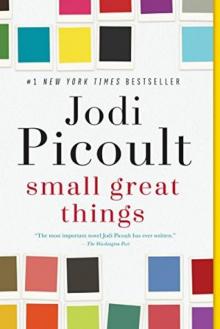 Small Great Things
Small Great Things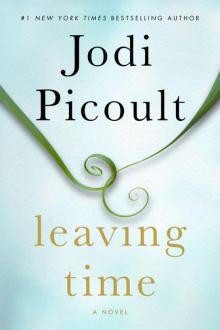 Leaving Time
Leaving Time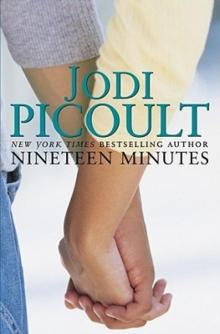 Nineteen Minutes
Nineteen Minutes Larger Than Life
Larger Than Life Perfect Match
Perfect Match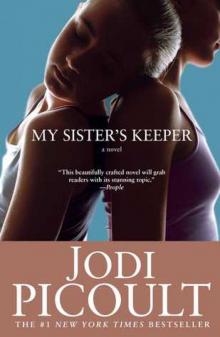 My Sister's Keeper
My Sister's Keeper The Pact
The Pact Handle With Care
Handle With Care Songs of the Humpback Whale
Songs of the Humpback Whale Mermaid
Mermaid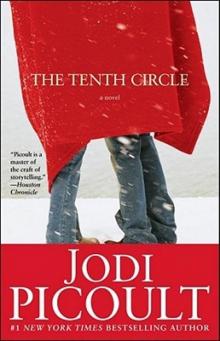 The Tenth Circle
The Tenth Circle The Color War
The Color War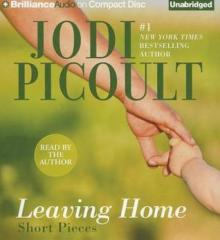 Leaving Home: Short Pieces
Leaving Home: Short Pieces House Rules
House Rules Lone Wolf
Lone Wolf The Storyteller
The Storyteller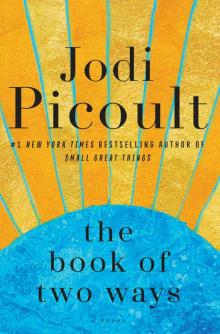 The Book of Two Ways
The Book of Two Ways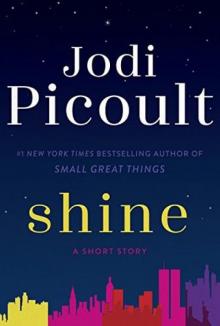 Shine
Shine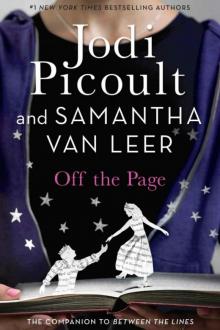 Off the Page
Off the Page Sing You Home
Sing You Home Second Glance: A Novel
Second Glance: A Novel Mercy
Mercy Vanishing Acts
Vanishing Acts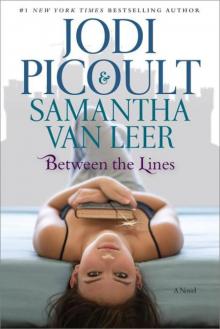 Between the Lines
Between the Lines Plain Truth
Plain Truth Salem Falls
Salem Falls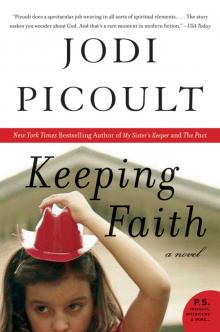 Keeping Faith
Keeping Faith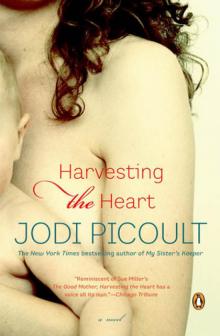 Harvesting the Heart
Harvesting the Heart Change of Heart
Change of Heart Where There's Smoke
Where There's Smoke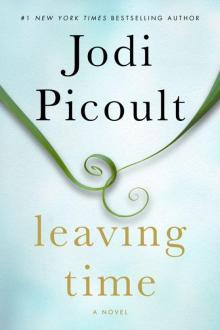 Leaving Time: A Novel
Leaving Time: A Novel Over the Moon
Over the Moon House Rules: A Novel
House Rules: A Novel The Jodi Picoult Collection #2
The Jodi Picoult Collection #2 Leaving Home: Short Pieces (Kindle Single)
Leaving Home: Short Pieces (Kindle Single) My Sister's Keeper: A Novel
My Sister's Keeper: A Novel![Mermaid [Kindle in Motion] (Kindle Single) Read online](http://i1.bookreadfree.com/i1/04/03/mermaid_kindle_in_motion_kindle_single_preview.jpg) Mermaid [Kindle in Motion] (Kindle Single)
Mermaid [Kindle in Motion] (Kindle Single) The Jodi Picoult Collection #4
The Jodi Picoult Collection #4 Sing You Home: A Novel
Sing You Home: A Novel The Jodi Picoult Collection
The Jodi Picoult Collection Lone Wolf A Novel
Lone Wolf A Novel Second Glance
Second Glance Larger Than Life (Novella)
Larger Than Life (Novella) The Jodi Picoult Collection #3
The Jodi Picoult Collection #3